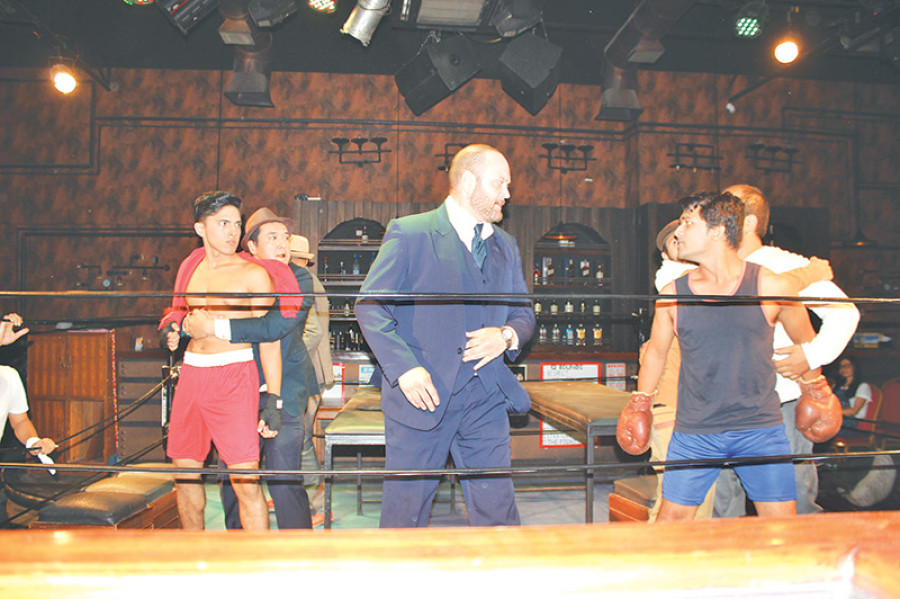Entertainment
1930’s New York in Kathmandu
Walking into Karma Bar and Lounge, I was astonished to find a full-size boxing ring that seemed to have grown overnight on the dance floor. Furthermore, the bandstand now held chairs and tables evoking a simple,
Kurchi Dasgupta
Walking into Karma Bar and Lounge, I was astonished to find a full-size boxing ring that seemed to have grown overnight on the dance floor. Furthermore, the bandstand now held chairs and tables evoking a simple, Western living room while a massive punching bag hung facing it, at the other end of the lounge. The lounge-cum-theque itself looked unrecognisable, set up as it was like an arena. This surely was one of the most innovative sets I have come across in Kathmandu and I urge you to go and sit through One World Theatre and Highly High Entertainment’s production of Golden Boy for the amazing experience of space, seating, lights and music if nothing else.

Of course there is a lot else involved. Deborah Merola has ably directed a twenty plus cast of talented actors and professional boxers to materialise Clifford Odet’s greatest success on stage, Golden Boy. One would not expect a 1930’s, American theatre classic to hold you enthralled through a mostly Nepali cast, but it does. Set in 1937 New York, at a time when the US was still reeling from the Great Depression and when poverty and lack of opportunities had already throttled American dream, when the Group Theatre was struggling to keep afloat its dream of creating an original and naturalistic theatre tradition based on the Stanislavskian system, and when ‘the feeling of no possessions’ was drowning a generation’s hope. Joe Bonaparte rises from such hopelessness, trained in playing the violin since childhood to hopefully become the city’s best violinist one day and throws away his musical career to turn into a boxing prize-fighter instead. Joe’s only aim was to rise above his circumstances and earn money at a great speed—and it is speed that destroys him in the end. Amrit Dahal holds his own as the brash, charging bull of a newcomer Joe against a seasoned and versatile cast. Interestingly, this is Dahal’s debut as a male lead. He is agile during the fight scenes and suitably arrogant in his interactions with others but comes across as surprisingly sensitive and sincere in the many romantic moments that he has with Namrataa Shrestha. Shrestha as Lorna Moon is a femme fatale incarnate and embodies the play’s film noir undertones thanks to her seductive grace and superb histrionic skills. Her character pegs a higher notch because of her perfect costuming, makeup and hairdo (for which Uttam’s Creation, Siwangi, Kritika Chuke and Bliss deserve mention for a thorough job done not only on her but for the whole cast).
But it is Alejandro Merola’s Tom Moody or Lorna’s fiancé, who steals the show as an over the top and over the hill boxing manager for Joe. His gestural precision and dialogue delivery as a somewhat bumbling impressario are quite, quite flawless and are ably foiled by the scorching but suave presence of Divya Dev’s Eddie Fuseli, a gangster investor. Divya Dev acted as a catalyst whenever he was on stage, bringing a menacing edge to the play’s softer emotions. Which brings me to Rajkumar Pudasaini, whom I have witnessed on Kathmandu’s English stage for quite some time now and never have I seen him achieve such consistency of character, emotive facility and clarity of enunciation as in the role of Joe’s father, the Italian immigrant Mr Bonaparte.

Saroj Aryal with his lisping accent did a good job as the trainer Tokio. Bikash Gurung’s Roxy, the prize-fight promoter and Prakesh Sindhuliya’s Frank Bonaparte as Joe’s brother are adequate. The Schopenhauer spewing Mr Carp was played to perfection by Sajag Rana, as was a very believable and virile Siggie by Hemanta Chalise to Shanti Giri’s homely Anna. Utpal Jha, Sandesh Shakya, Himanshu Goyal, Parikshit Bikram Rana, Satish Prasai, Kundoon Shakya, Deepak Sapkota all do their bits with committed sincerity. Sandeep Shrestha’s Barker, though allows him only a few minutes on stage, is strong enough to leave a mark. Lastly, the real professional boxers Kishor Sharma, Ganesh Thapa and Nivas Tandukar, who put up a live fight during intermission is an added bonus for which owe the Naxal Boxing Club, and the famed Yaqui Lopez of the Fat City Boxing Gym of California; and to Alizé Biannic for the final, ethereal dance sequence.
Dawa Stephen Sherpa’s stage design has already been lauded, but Aditya Katwal and Alizé Biannic’s music and sound are brilliant too—we go from a Caruso to what sounded like a Bach solo suite to my untrained ears to 1930’s pop with lilting ease; as is Pariksha Lamichhane’s lights that transform the insides of Karma into an arena, a living room and an office in seconds.
The experience of Golden Boy is quite a first for Kathmandu, thanks to Deborah Merola’s vision and directional skill, and is an experience like no other available in the city.




 9.33°C Kathmandu
9.33°C Kathmandu










